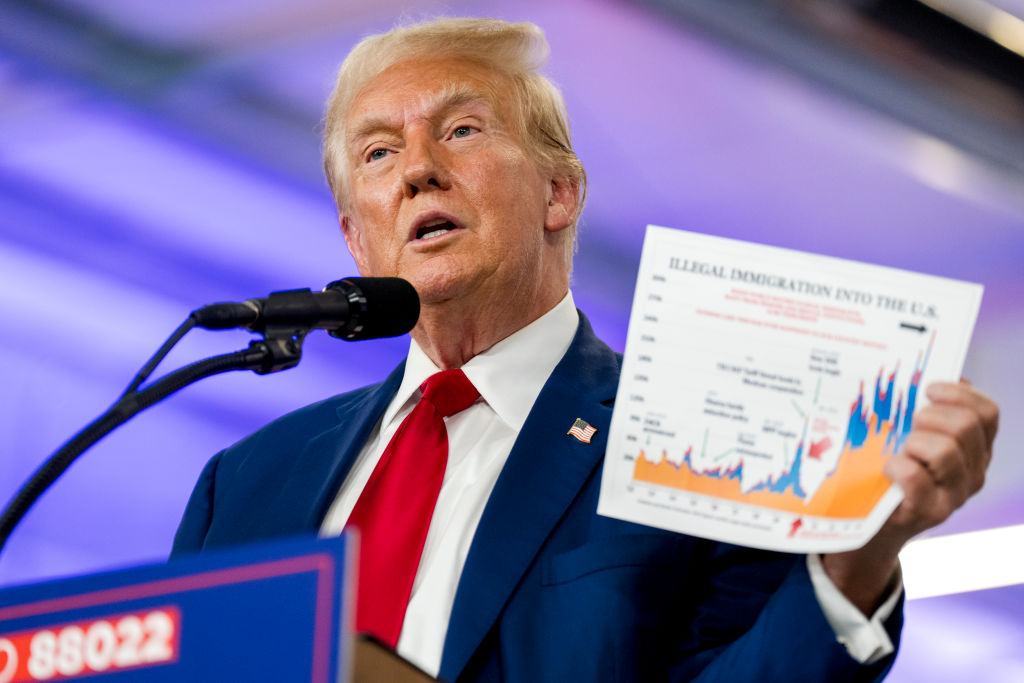“You don’t have to go home, but you can’t stay here.” So goes the bartenders’ refrain to customers at closing time. The Trump administration is issuing that same call to millions of illegal immigrants, beginning with the most violent (and those caught staying with them). You can’t stay here.
It’s a wildly popular stance, but it is running into predictable problems.
The first is that rounding up the millions here illegally is costly, time-consuming and sometimes dangerous. That problem was vastly increased by Joe Biden’s deliberate decision to open the southern border, allow millions of people to cross it illegally and then lie to the public and Congress about what his administration was doing.
President Biden, Vice President Harris and Secretary of Homeland Security Mayorkas repeatedly said the border was “closed and secure” when they knew it was not. Mayorkas said it in sworn testimony to Congress. These weren’t just lies; they were stupid lies because voters could see the increasing problems and the obvious deceit.
Second, while Biden ignored the laws protecting our borders and did so with legal impunity, the immigrants gained rights of due process once they arrived on American soil. Again, the Biden administration failed in its basic responsibilities, with considerable support from the entire Democratic Party. The Biden administration could have detained these illegal immigrants at the border, which would have facilitated swift, legally appropriate deportation. They chose not to. Instead, they released almost all the illegal arrivals into the country’s interior. Some were given instructions to return in several years for court hearings. Some were simply released with no instructions or documentation.
Those policies swamped states and localities with new, illegal residents and vast expenditures for schools, housing, healthcare, crime prevention and more. The “sanctuary” policies of many blue cities and states invite them to come and stay. One unanticipated result has been a deepening cleavage within the Democratic Party, pitting progressives (who favor the influx without ever saying the word “illegal”) and minority voters who rely on jobs and government services that are under greater pressure.
Many of these migrants were simply looking for a better life, but that noble aspiration doesn’t qualify them for “asylum status.” All of them apply for it, however, because it ensures a much longer stay before courts can rule on that claim. More than 90 percent are eventually turned down, but only after they receive court hearings. That’s an almost insurmountable problem after millions have arrived illegally and put forward these asylum claims.
An equally large – and far more dangerous – problem is the criminal gangs who arrived under Biden’s policies. The most recent is Tren de Aragua, the Venezuelan prison gang, released by the Maduro government to invade the US, and now a transnational criminal enterprise. But they are hardly alone. MS-13 is from El Salvador. The Sinaloa Cartel and several others are from Mexico. Together, they form the most serious problem of organized crime in the a century, since the Mafia grew powerful importing and distributing liquor during Prohibition. It is worth remembering that once the Mafia had established its international supply channels and local distribution networks, the organizations became deeply embedded in American cities. Prohibition was repealed, but the Mafia endured.
That’s the danger today with the Mexican, Salvadoran and Venezuelan gangs that flooded across the border during the Biden years. They are now embedded themselves across America, earning their money from distributing fentanyl, methamphetamine, cocaine, crack and other drugs, as well as human trafficking, including child sex-trafficking. The base materials for fentanyl come from China into Mexico, where the pills are manufactured and legitimate medicines adulterated with deadly drugs. The combination of big money and lethal threats have turned local governments across Mexico into partners-in-crime.
Decimating these gangs is priority number one for the Tom Homan, who leads the Trump effort to stop illegal immigration. Arresting and deporting (or imprisoning) these gang members is at the top of Homan’s agenda.
Third, Homan and the Trump administration are getting no help from local judges, prosecutors and Democratic officials in blue (Democratic) cities and states. Those jurisdictions long ago proclaimed their “sanctuary” status. They raised that flag when it was costless virtue signaling for the party’s activist base. Now, with the costs rising catastrophically, those progressive officials have clung to their sanctuary status.
Because America is a federal republic, those jurisdictions have considerable scope to implement those policies, even if they contradict national ones. Still, sanctuary status has its legal limits. Put simply, it means that local officials and courts need not assist the federal government in enforcing immigration law, but they cannot impede it. Impeding federal enforcement is a felony, and that’s the charge now confronting two local judges (one in Massachusetts, one in Wisconsin) for apparently helping illegal immigrants escape from their courtrooms, even though the judges knew federal agents were waiting outside to arrest those immigrants.
Local judges and officials aren’t the only obstacle to Trump’s immigration enforcement. Federal district judges are the fourth obstacle. Time and again, those judges have ruled that the Trump administration acting illegally by failing to give arrested immigrants their due-process rights. Those cases are now under appeal. Other federal judges have tried to block the administration from using the centuries-old Enemy Aliens Act to deport aliens with limited due-process. Still others are trying to sustain the Biden administration’s “come to America free” card, handed out to hundreds of thousands of immigrants from Haiti and several other countries.
Dozens of district judges have stretched their authority beyond the breaking point by issuing nationwide rulings, not confined to their own judicial district or to the litigants before them. The Supreme Court invited this mess by failing to provide clear guidance for these judges and demanding they adhere to them.
The result is that what one president can do by fiat or inaction, flinging open the border, his successor cannot undo by declaration, legally or practically.
What President Trump can do, however, is revoke the visas and Green Cards of any immigrant who, in his view, undermines America’s national interest. It is important to remember that holders of visas and Green Cards are not illegal immigrants. They came here legally, with permission, typically to study at universities. They can remain here legally if they don’t violate the law or overstay the time limits they were granted.
The crucial point is that they do not have to be convicted of a crime to have their cards revoked. They are here solely at the discretion of the US government, which can revoke their cards unilaterally, if the government believes it is in the national interest. That’s exactly what Secretary of State Marco Rubio is doing to students involved in anti-Israel, anti-American demonstrations across the country, like the violent takeover of Columbia University’s library this week.
Foreign students have responded by hiding their faces during demonstration and letting American students and groups like Antifa lead the violent disruptions. Expect very tight restrictions on the issuing of new student visas, particularly to those from the Middle East. Democrats will respond by calling it Islamophobia. (Universities will face yet another financial blow because most foreign students pay full tuition and some countries, notably Qatar, provide significant donations to major universities.)
Chinese students and the Chinese Communist Party’s surveillance and intelligence operations at major research universities are likely to become another issue for the administration. It would not be surprising to see tight constraints placed on the numbers of visas granted to Chinese students and researchers. The logic is straightforward. Why grant an enemy nation access to our country’s most sensitive information and hard-won scientific insights?
The final obstacle to deporting illegal aliens is “where to send them”? Of course, they should be returned to their country of origin, but some countries refuse to take them. The principal Refusniks are America’s enemies: China, Venezuela and Cuba, plus a few more. (We have almost no students from Russia and Iran.) Still, the US can deport these illegal migrants to third countries that are willing to take them. Those recipients are poor countries, led by El Salvador, eager to curry favor with the Trump administration and receive specific benefits (none of which have been revealed so far). CBS reports the US is negotiating additional deportation deals with Angola and Equatorial Guinea. Guatemala, Mexico and others have already agreed to take deportees from other countries, though often with strict limits on the numbers. The US is busy negotiating deals with other countries in Africa and Central Europe.
Trump fueled domestic opposition to these policies with loose talk. Why even suggest shipping imprisoned American citizens to foreign jails? No courts will allow that, nor should they. Trump’s opponents underscore the point because, they say, it illustrates a fundamental problem with his presidency: he ignores clear constitutional boundaries on his actions.
Trump’s most innovative – and cost effective – idea is to assist voluntary self-deportations by providing free flights and a $1,000 incentive. How many people will take the offer remains to be seen.
Expect the political battles over deportation to continue throughout the Trump presidency and beyond. That’s partly because Trump gains politically from these popular policies, partly because the Democrats keep raising the issue but are confused about how to respond.
But the main reason the issue will linger is that the problems are so large, so costly and so dangerous. And American citizens know it.


























Leave a Reply